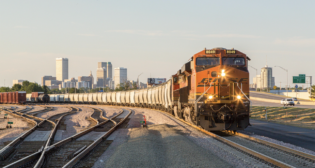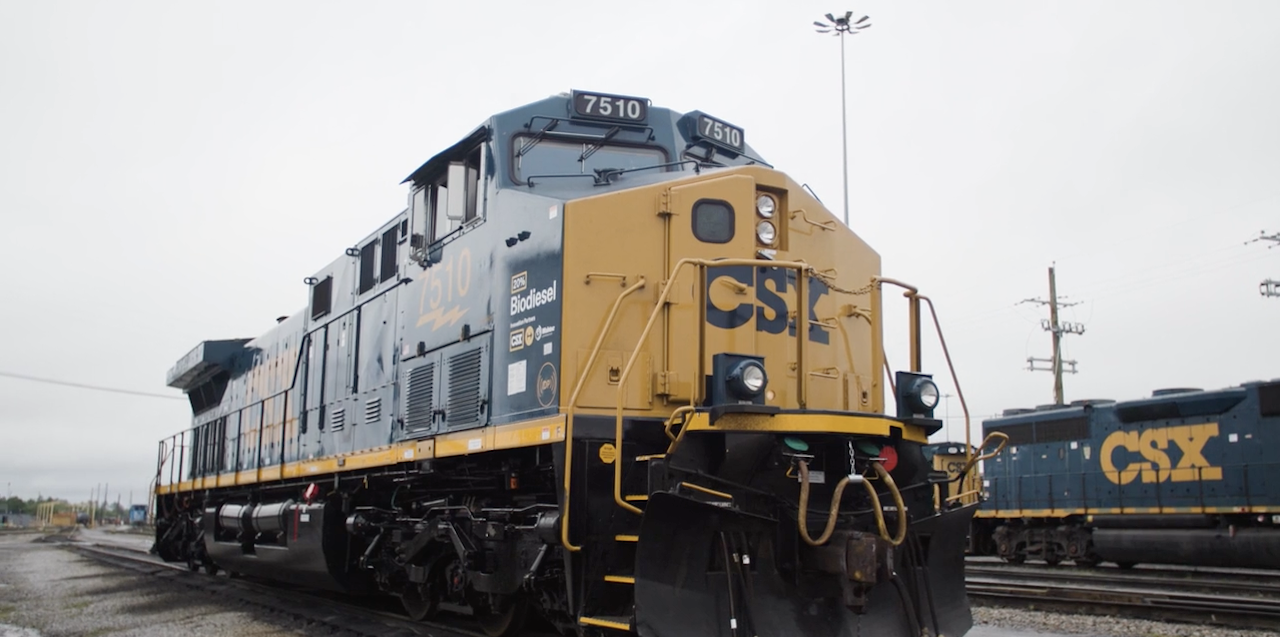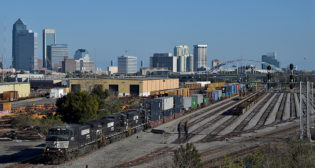
CSX Carries Out B20 Fuel Testing in Tampa Fleet
Written by Carolina Worrell, Senior Editor
CSX on July 14 reported that testing of 20% soybean oil-based fuel in a locomotive fleet serving Tampa, Fla.-based phosphate customer Mosaic, which began in 2022 to demonstrate the effectiveness of the B20 biodiesel blend in Wabtec FDL Advantage engines, “continues to yield impressive results.”
According to CSX, the 10 locomotives in the test have burned more than 200,000 gallons of B20 fuel, which reduces greenhouse gas (GHG) emissions by nearly 20%. The goals of the project, the Class I says, are to “provide verified emissions-reduction data, monitor the impacts of burning B20 on locomotive engine components, and gain approval from the U.S. Environmental Protection Agency (EPA) for long-term use of higher biodiesel fuel blends in locomotives.” CSX expects to complete the test this year and submit data to EPA.
The project, CSX says, is a prime example of collaboration, involving the railroad, the locomotive manufacturer and the customer. Based in Pittsburgh, Penn., Wabtec has modernized the 10 AC4400 locomotives with FDL Advantage engine technology and will periodically perform necessary EPA emissions testing on these units at its Erie, Penn., facility. In addition, the CSX Mechanical Department has been collecting B20 fuel samples to verify its composition.
Wabtec in 2019 announced its FDL Advantage offering—an upgrade to the existing FDL engine that provides “significant fuel savings at the Tier 1+ emission level.” It features improved air handling and a high-pressure common rail fuel system that offers improved injection control. Wabtec currently has more than 40 locomotives operating with various blends of fuels, for example, 20% biodiesel and 80% renewable diesel.
Wabtec’s FLXdrive program is also progressing to the next level. The 2.4 MWH “version 1.0” successfully tested with BNSF between Barstow to Stockton, Calif., registering an 11% fuel savings operating in a consist with two diesel-electrics, vs. a three-unit diesel-electric. This will be followed by the FLXdrive 2.5, which replaces the NMC (nickel-manganese-cobalt) batteries with GM’s Ultium NCMA (nickel-cobalt-manganese-aluminum) technology manufactured by Ultium Cells LLC, a joint venture of GM and LG Energy Solution.
The phosphate customer, Mosaic, has also been a key partner in the project, according to CSX. As a company with a strong environmental commitment of its own, CSX says Mosaic agreed to allow the testing to take place on the fleet that operates in dedicated service to its mining, manufacturing and distribution operations in the Tampa area. Operating the locomotives in closed-loop service has provided a controlled test environment.
“It’s a win long term for us, but it’s also a win for our shippers,” said CSX Senior Vice President of Sales and Marketing Arthur Adams. “I’m excited about the broader impact this will have in enabling our customers to accelerate some of the commitments they’ve made to their customers to reduce their environmental footprint.”
Watch the video below to learn more about the B20 fuel testing and hear from the companies supporting the project.
Last month Canadian Pacific Kansas City (CPKC) and CSX announced a planned joint venture for the building and development of hydrogen locomotive conversion kits for diesel electric locomotives.
As an initial step in the collaboration, CSX says it plans to convert one of its diesel locomotives using a hydrogen conversion kit developed by CPKC. The conversion work will be done at CSX’s Huntington, West Virginia locomotive shop.

![[Photo by Christopher Rosario U.S. Army Corps of Engineers, Baltimore District]](https://www.railwayage.com/wp-content/uploads/2024/05/dalibowcrush-315x168.jpg)

